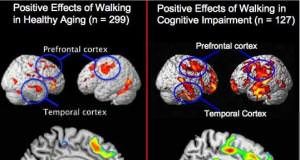Daily Dose Of Beet Juice Promotes Brain Health In Older Adults
Researchers for the first time have shown that drinking beet juice can increase blood flow to the brain in older adults -- a finding that could hold great potential for combating the progression of dementia. The research findings are available online in Nitric Oxide: Biology and Chemistry, the peer-reviewed journal of the Nitric Oxide Society and will be available in print soon.
Silent Vascular Disease Accompanies Cognitive Decline In Healthy Aging
Older people who are leading active, healthy lifestyles often have silent vascular disease that can be seen on brain scans that affect their ability to think, according to a new study led by UC Davis researchers and published online in the Archives of Neurology, one of the JAMA Archives journals.
Yoga’s Ability To Improve Mood And Lessen Anxiety Is Linked to...
Yoga has a greater positive effect on a person's mood and anxiety level than walking and other forms of exercise, which may be due to higher levels of the brain chemical GABA according to an article in The Journal of Alternative and Complementary Medicine, a peer-reviewed journal published by Mary Ann Liebert, Inc. The article is available free online.
Light At Night Causes Changes In Brain Linked To Depression
Exposure to even dim light at night is enough to cause physical changes in the brains of hamsters that may be associated with depression, a new study shows. Researchers found that female Siberian hamsters exposed to dim light every night for eight weeks showed significant changes in a part of the brain called the hippocampus.
Diabetes Drug Could Work Against Alzheimer’s, Animal Study Suggests
Metformin, a drug used in type 2-diabetes might have the potential to also act against Alzheimer's disease. This has been shown in a study from scientists of the German Center for Neurodegenerative Diseases (DZNE), the University of Dundee and the Max-Planck-Institute for Molecular Genetics.
Walking Slows Progression Of Alzheimer’s
Walking may slow cognitive decline in adults with mild cognitive impairment (MCI) and Alzheimer's disease, as well as in healthy adults, according to a study presented November 29 at the annual meeting of the Radiological Society of North America (RSNA).
Diabetes May Clamp Down On Cholesterol The Brain Needs
The brain contains more cholesterol than any other organ in the body, has to produce its own cholesterol and won't function normally if it doesn't churn out enough. Defects in cholesterol metabolism have been linked with Alzheimer's disease and other neurodegenerative conditions. Now researchers at Joslin Diabetes Center have discovered that diabetes can affect how much cholesterol the brain can make.
New Method For Preventing Oxidative Damage To Cells: Findings Could Lead...
The discovery by UCLA biochemists of a new method for preventing oxidation in the essential fatty acids of cell membranes could lead to a new class of more effective nutritional supplements and potentially help combat neurodegenerative disorders such as Parkinson's disease and perhaps Alzheimer's.
Compound Derived From Curry Spice Is Neuroprotective Against Stroke And Traumatic...
A synthetic derivative of the curry spice turmeric, made by scientists at the Salk Institute for Biological Studies, dramatically improves the behavioral and molecular deficits seen in animal models of ischemic stroke and traumatic brain injury (TBI). Two new studies suggest that the novel compound may have clinical promise for these conditions, which currently lack good therapies.
Boosting Supply Of Key Brain Chemical Reduces Fatigue In Mice
Researchers at Vanderbilt University have "engineered" a mouse that can run on a treadmill twice as long as a normal mouse by increasing its supply of acetylcholine, the neurotransmitter essential for muscle contraction. The finding, reported this month in the journal Neuroscience, could lead to new treatments for neuromuscular disorders
Walking Slows Progression of Alzheimer’s, Study Suggests
Walking may slow cognitive decline in adults with mild cognitive impairment (MCI) and Alzheimer's disease, as well as in healthy adults, according to a study presented November 29 at the annual meeting of the Radiological Society of North America (RSNA).
Alzheimer’s Disease: Are Plaques and Tangles A Symptom, Not the Cause?
Karl Herrup thinks that the national research effort to understand Alzheimer's disease has gone about as far as it can go with its current theories. And that's not far enough. Alzheimer's disease is an incurable, degenerative, eventually fatal disease that attacks cognitive function. It affects more than 26 million people around the world and is the most common form of dementia among people over the age of 65.














